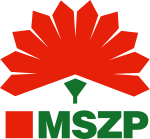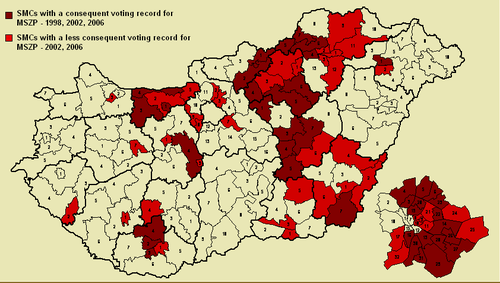- Hungarian Socialist Party
-
Hungarian Socialist Party
Magyar Szocialista Párt
Leader Attila Mesterházy Founded 9 October 1989 (descendant of the Hungarian Socialist Workers' Party) Headquarters 1066 Budapest, VI. Jókai utca 6. Youth wing Societas – Új Mozgalom
(Societas – New Movement)Ideology Social democracy,
Third Way[1]Political position Centre-left International affiliation Socialist International European affiliation Party of European Socialists European Parliament Group Progressive Alliance of Socialists and Democrats Official colours Red National Assembly: 
European Parliament: 
Website http://mszp.hu/ Politics of Hungary
Political parties
ElectionsHungary 
This article is part of the series:
Politics and government of
Hungary- Constitution
- President
- Prime Minister (List)
- National Assembly
- Speaker
- László Kövér
- Speaker
- Political parties
- Fidesz - Jobbik - KDNP
LMP - MDF - MSZP - Other parties
- Fidesz - Jobbik - KDNP
- Constitutional Court
- Elections
- Regions
- Counties
- Subregions
- Cities, towns, and villages
- Politics of the European Union
- Foreign relations
The Hungarian Socialist Party (Hungarian: Magyar Szocialista Párt, MSZP) describes itself as a social democratic party in Hungary. It is the partial successor of the communist Hungarian Socialist Workers' Party (or MSZMP), which ruled Hungary between 1956 and 1989. The decision to declare the party a successor of the MSZMP was controversial, and still carries repercussions for both the MSZP and Hungary. Another source of controversy is that some members of the former communist elite maintained political influence in the MSZP, a factor which is still true today. Indeed, many key MSZP politicians were active members or held leadership positions within the MSZMP. The party is not to be confused with the Workers' Party, a marginal party of hardline communists and another successor to the MSZMP.
On economic issues, the Socialists have often been greater advocates of liberal, free market policies than the conservative opposition, which has tended to favor more state interventionism in the economy through economic and price regulations, as well as through state ownership of key economic enterprises. The MSZP, in contrast, implemented a strong package of market reforms, austerity and privatization in 1995-96, when Hungary faced an economic and financial crisis. Besides a more liberal approach to the economy overall, the MSZP also differentiates itself from the conservative opposition through its more recent focus on transforming state social policy from a collection of measures that benefit the entire population, such as subsidies available to all citizens, to one based on financial and social need.
In political terms, the MSZP differentiates itself from its conservative opponents mainly in its rejection of nationalism. The party, along with its minority liberal partner in the governing coalition, campaigned against extending Hungarian citizenship to ethnic Hungarians living in neighboring countries in a December 5, 2004 referendum. The referendum failed due to insufficient voter turnout, but tensions remain over the fate of Hungarian minorities abroad, which in some countries have faced hostility or even a degree of persecution at the hands of majority cultures, particularly when nationalist or populist governments have been in power in those countries.[citation needed]
The party is a member of the Socialist International and the Party of European Socialists, and it holds a chairmanship and several vice-chairmanships in committees at the European Parliament). Internally, party members hold a variety of opinions, containing rival groups, e.g. factions both for and against the prime minister, Ferenc Gyurcsány.
Besides Gyurcsány, the MSZP's most internationally recognized politicians are Gyula Horn and László Kovács, currently member of the European Commission responsible for taxation.
At the 2006 elections, MSZP won with 43.2% of party list votes, which gave it 190 representatives out of 386 in the Parliament. The MSZP was therefore able to retain its coalition government from the previous term. In earlier elections, the MSZP polled 10.89% (1990), 32.98% (1994), 32.92% (1998) and 42.05% (2002). The current surveys show, that the MSZP has 20%.
MSZP formed the first minority government of Hungary, following the SZDSZ's backing out of the coalition with a deadline of May 1, 2008.
MSZP lost the 2010 elections (won by Fidesz with a 2/3 majority), gaining only 19,3% of the votes, and 58 seats in the parliament. Currently, they are the biggest opposition party in Hungary.
Katalin Szili, a former Speaker of the National Assembly of Hungary formed the Movement of Alliance for the Future in 2010 and had own candidates in some areas in the 2010 Hungarian parliamentary election. Szili was elected to the Parliament of Hungary via the Baranya County Party list where she was chairperson of the local MSZP chapter. After the 2010 local elections, held on the 3rd of October, she founded the Social Union and became its first chairperson. As a result, she quit the Hungarian Socialist Party and their parliamentarian group. Continuing the parliamentarian work as formally independent MP.[2]
On 22 October 2011 Ferenc Gyurcsány has announced he is leaving the Socialist Party and will set up a new parliamentary group after succeeding in persuading the necessary number of lawmakers to join him. The new Democratic Coalition party is to be a “Western, civic centre-left” formation with ten lawmakers, Gyurcsány announced on the first anniversary that its forerunner, the Democratic Coalition Platform, was set up.[3]
Contents
Parliamentary representation
Year Seat percentage Seats Popular votes Status 1990 8.55% 33 419,152 opposition 1994 54.1% 209 2,921,039 government 1998 34.7% 134 1,497,231 opposition 2002 46.11% 178 2,361,997 government 2006 49.22% 190 2,336,705 government 2010 19.3% 58 990,428 opposition Leaders
Chairman:
- Attila Mesterházy
Deputy chairman:
- András Balogh
Vice chairmen:
- László Kovács
- Tamás Szabadkai
Single Member Constituencies Voting Consistently for MSZP
The image shows Single Member Constituencies (or SMCs) voting for MSZP in 1998, 2002, 2006 in dark red, while showing SMCs voting for MSZP in 2002 and 2006 in red. The dark red districts are considered the strongest positions of the party.
Most if not all districts shown in dark red and red also voted for MSZP in 1994, a landslide victory for the party. So actually, dark red districts have an even longer uninterrupted voting history of supporting MSZP.
Gallery
-
Ferenc Gyurcsány delivering a speech to his party
See also
References
External links
 Political parties in Hungary
Political parties in HungaryRepresented in the
National Assembly (386)Fidesz – Hungarian Civic Union (227) · Hungarian Socialist Party (48) · Jobbik – Movement for a Better Hungary (46) · Christian Democratic People's Party (36) · LMP – Politics Can Be Different (15) · Independent (14)Not represented in the Parliament* Hungarian Democratic Forum (2.67 %) · Civil Movement (0.89 %) · Hungarian Communist Workers' Party (0.11 %) · Hungarian Social Democratic Party (0.08 %)
* Limit for parties to join the National Assembly in Hungary is 5 % of popular votesRepresented in the
European Parliament (22)Fidesz – Hungarian Civic Union and Christian Democratic People's Party (14) · Hungarian Socialist Party (4) · Jobbik – Movement for a Better Hungary (3) · Hungarian Democratic Forum (1)Parties Member parties (EU)Member parties (non-EU)Associated parties (EU)Associated parties (non-EU)Observer partiesParty Presidents Wilhelm Dröscher · Robert Pontillon · Joop den Uyl · Vítor Constâncio · Guy Spitaels · Willy Claes · Rudolf Scharping · Robin Cook · Poul Nyrup RasmussenEuropean Parliament
Group PresidentsGuy Mollet · Hendrik Fayat · Pierre Lapie · Willi Birkelbach · Käte Strobel · Francis Vals · Georges Spénale · Ludwig Spénale · Ernest Glinne · Rudi Arndt · Jean-Pierre Cot · Pauline Green · Enrique Barón Crespo · Martin Schulz · see European Parliament
European Commissionners Catherine Ashton (Foreign Affairs and Security Policy) · Joaquín Almunia (Competition) · Maroš Šefčovič (Inter-Institutional Relations and Administration) · Maria Damanaki (Maritime Affairs and Fisheries) · Štefan Füle (Enlargement and European Neighbourhood Policy) · László Andor (Employment, Social Affairs and Inclusion) · see Barroso II CommissionHeads of government
at the European CouncilWerner Faymann (Austria) · George Papandreou (Greece) · Borut Pahor (Slovenia) · José Luis Rodríguez Zapatero (Spain) · see European CouncilEurofoundation: Foundation for European Progressive StudiesCategories:- Political parties in Hungary
- Social democratic parties
- Socialist International
- Socialist parties
- Party of European Socialists member parties
- Political parties established in 1989
Wikimedia Foundation. 2010.




